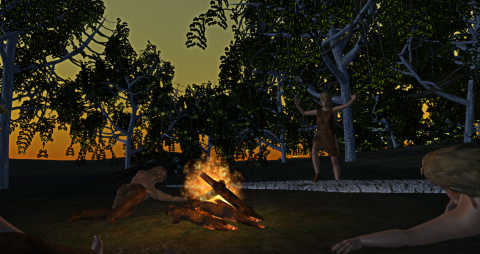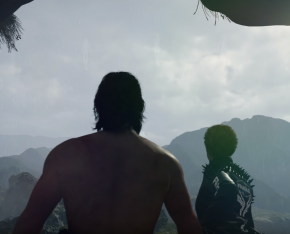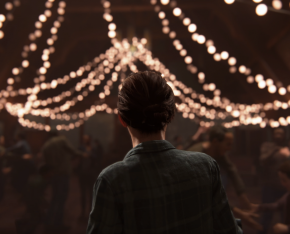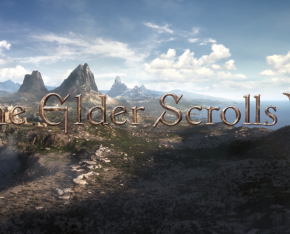By Simon Moore on June 24, 2015 at 8:09am
You may remember back in February we had a look at Flintlock Studio’s ‘Lithic’, the stone age fantasy RTS. You can check out that article here, but to give you a brief run down; Lithic will see you, the player, lead a small society of prehistoric folk through the trials and tribulations of living in a very real world. You’ll need to hunt, gather and develop your society to survive. This includes passing on key skills and knowledge to the next little generation of villagers to continue your forward growth
There are two key features that Flintlock are implementing for “Lithic” as they attempt to bring a whole new experience to the RTS genre. Reimagined AI, much like the Sims, the AI in “Lithic” will be able to look after itself, the tribe members will know when to eat and when to sleep so you don’t have to worry about micromanaging their daily lives. Traditional RTS games have often relied heavily on you knowing exactly who is doing what and where, which can often detract from the gameplay.
We know that often it can turn into a micro-management sim with the player constantly having to worry about every small thing that is happening. The AI of Lithic is taking away a lot of that. The AI will make sure tribe members are eating and sleeping when they need to, meaning that the player can concentrate on the bigger tasks like combat or skill building. Tom Stevenson
The second feature focuses on the skills and tech-tree of “Lithic”. Your tech tree is not available to the whole tribe, its individual skills and individual knowledge that is accrued, each tribe member becoming potentially invaluable in ensuring your future. Careful management of these people and skills will be just as important as finding your food source.
Flintlock Studios and “Lithic” are currently on Kickstarter where they are looking to raise £10,000 to finish this current development phase of the game. The current phase of development will end with an Early Access release and we have had a chance to have a chat with the developers over at Flintlock about this next stage, particularly Tom Stevenson the lead developer and Jon Hughes the lead designer.
PlayerTheory: Lithic has been on steam greenlight since January 2015, how have you found the community response to the project? Has this had an impact on taking the game onto Kickstarter?
Jon: Overall the response has been really positive. It’s been a clear signal to us that there are the players out there who want to see this game made. In terms of taking it to Kickstarter, it has played a small part in that, because obviously if all the response we had had was negative we would know that there isn’t the kind of community support that we need to get Lithic made.
PT: To ask, what have you planned should the project not reach its £10,000 funding goal? You mentioned on the Flintlock blog that you’ve had a few setbacks in terms of timescales. Will this potentially delay the project more should the goal not be reached?
Tom: If the Kickstarter should fail it won’t be the end of Lithic but it would most likely mean that we would have to re-look at time scales in terms of the Early Access and final release of the game. We had two major setbacks in earlier development – the first was the change to physically based rendering which meant we had to re-do all our textures and the second was some game breaking changes to the beta versions of Unity 5. As the texture changeover work is now all done and Unity 5 is in release we don’t be seeing repeats of these.
PT: We know your intention is to have an early access available on steam in the next few months, do you feel an element of pressure to deliver a quality product even at this stage? Do you have an ideal build you want to get too before you hand it over to the fans on early access?
Jon: Exactly how complete Lithic is at Early Access is dependent in part on how the Kick-starter campaign. At our £10,000 goal we’ll be able to go to Early Access with all the core features of Lithic implemented but with only one playable race and in one biome. We’ll then expand on this in updates.
PT: You have what appear to be a lot of ambitious ideas for Lithic. Have these expanded during your production of the title, or have you found yourself having to reign in the project as you progress in an attempt to not over complicated things?
Jon: We focussed early on in prototyping on deciding what we wanted and what was possible, from that we had a very clear picture of what Lithic would be. We’ve not really changed the core mechanics from day one, I think the only significant change that has been made during active development is the appearances of the playable races as we decided they all looked a bit too similar.
PT: How have you found working in Unity 5? You’ve recently gone through a graphics overhaul and discovered as you mentioned in the blog ‘game breaking bugs’. Has Unity 5 made it easier to deal with these problems?
Tom: We were very lucky to have access to the Beta version of Unity 5 so Lithic will be one of the first games that’s been fully developed in Unity 5 as opposed to ported in which we are pretty excited about. Some of the game breaking bugs have occurred because we’ve been working in a beta version of the engine, and these have sometimes taken more time than expected to fix because there’s been no official documentation out about them. Unity’s ability to run the game direct from the editor and it’s built in profiler and code complier definitely made it easier to (and quicker to!) sort out problems when they occur.
PT: You’ve got a very unique skill system in the game, development and progression of your clan is based on their ability to discover and pass on skills to their companions and the next generation. Have you discovered any problems when attempting to implement a system like this? Have you had to reconsider any aspects of this approach?
Tom: Behind the scenes the code for this really isn’t any different to any kind of skill system. The major difference is when and how skills advance. We’re implementing a tried and tested game mechanic, just from a different angle, it hasn’t caused any problems.

PT: Perma death is a real concern in Lithic, it’s something players should learn to fear due to the potential loss of key skills and knowledge, will the game have any contingency plans for the players should they have a disaster of sorts. An example being the loss of the majority of the clan? The loss of a single member would not have the same impact as the loss of a dozen, but in the latter instance will players be forced to start at square one? Obviously they, in a natural sense, would have to but from a gameplay perspective do you think people may be put off by ‘restart’ that may be required.
Jon: Lithic was never intended to be easy – sometimes things will go wrong. This was the main challenge of the game design, overcoming the adversities of survival. In your example the player could certainly survive even if the Tribe is reduced to just one member. Whether they want to try or just start again isn’t something we can or should, try to control. I don’t think this is off-putting. Lithic is a strategy game, not an action game, so forward planning and overcoming setbacks are part of the gameplay.
PT: You’re aiming for a 2016 release. Do you think you’re on schedule for that or at least moving in the right direction? Several green lit games have gone into early access and reached their ‘stated’ release date only for the developers to change their mind at the last second and provide no information other than ‘we need more time’ (I’m referencing the problems that “War For the Overworld” had during its early access and subsequent 1 ½ year delay from their intended release date)
Tom: I can certainly say with confidence that we are moving in the right direction. What we want to make sure, and what we have tried to do since we have started is be clear and honest with anyone in our community about timelines. We know that people become frustrated with release dates that are moved, and as developers we get frustrated with ourselves if we can’t meet promises we’ve made. If it is starting to look like we are going to not make a deadline then we will be honest with those who have supported as, and also take the time to explain the reasons why.
PT: Yesterday Hidden Path Studios pulled Windborne from Steam altogether as they failed to get the funding they needed, you’ve obviously put a lot of time and effort into Lithic and you’re working hard on getting funding and a structure in place before you’ve even gone into early access. Do you think this will help you perhaps avoid having to stop production? Do you see yourselves finishing Lithic? (I know there can be unforeseen circumstances but you seem to be well positioned to avoid them.)
Jon: There’s no telling what could happen in the future, but as things stand at this point we have done everything we can have possibly done to be able to bring this game to release. Unfortunately because of a few relatively well publicised cases, people have had their hands burnt and now are more tentative about supporting these kinds of projects. The majority of indie games that get funding are successful and we have put as much planning in place as we possibly can to make sure we are one of those.
If your interested in supporting "Lithic" you can head over to their Kickstarter Page here.




